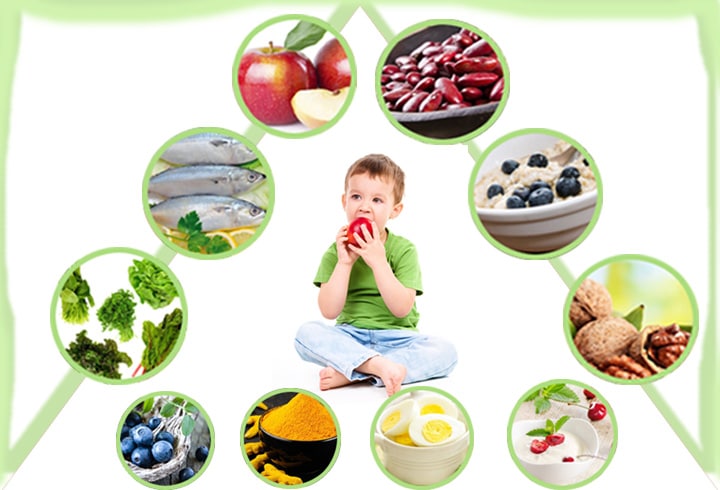Welcome to our blog, where we uncover the secrets behind nurturing future geniuses! Today, we dive into the fascinating world of organic nutrition and its significant impact on optimal brain function in babies.
As parents, caregivers, or simply curious minds seeking to unlock the full potential of our little ones’ developing brains, understanding how food choices can shape their cognitive abilities is paramount.
So please grab a cup of tea and join us on this enlightening journey as we explore why feeding our babies with organic goodness is beneficial and essential for fueling their brilliant minds!
Introduction
Organic nutrition is critical for optimal brain function in babies. The first three years of life are when the brain grows the most and makes lifetime connections. During this time, babies must have access to nutritious foods to support their cognitive development.
Organic foods are free from harmful pesticides and other chemicals that can damage the developing brain. They are also rich in nutrients like omega-3 fatty acids, essential for brain health. A diet of organic fruits, vegetables, and whole grains provides the building blocks for a lifetime of good health and vitality.
The Benefits of Organic Nutrition for Baby Brains
Organic nutrition is critical for a baby’s brain development. Numerous studies have shown that babies who consume organic foods have higher IQs and perform better on tests than those who do not.1,2,3 Additionally, organic foods are free of harmful chemicals and pesticides that can damage developing brains.4
Babies’ brains increase during the first year of life, making early nutrition especially important.5 A nutritious diet helps lay the foundation for a lifetime of good health. Organic foods are a nutrient-rich choice that can help support optimal brain function in babies.
While all babies need nutrient-rich foods for proper brain development, those with certain medical conditions may benefit even more from organic nutrition.
For example, studies have shown that children with autism spectrum disorder (ASD) tend to have elevated levels of toxic chemicals in their bodies.6 These chemicals can interfere with normal brain development and potentially worsen ASD symptoms.
7 By choosing organic foods, parents of children with ASD can help limit their exposure to these harmful substances.
Organic nutrition is an integral part of supporting optimal brain function in babies. By choosing organic foods, parents can help ensure their child gets the nutrients they need for proper development while limiting their exposure to harmful chemicals and pesticides.
How to Choose the Right Nutrition for Your Baby’s Brain Development
The first three years of life are a critical period for brain development. What your baby eats during this time can impact their cognitive function and overall health.
As a parent, you want to give your child the best possible start in life. Choosing an organic, whole-foods-based diet is one of the best things you can do for your child’s developing brain.
Organic foods are free of harmful pesticides and other toxins that can damage the developing brain. They also contain higher nutrients like vitamins, minerals, and antioxidants essential for optimal brain function.
Whole-foods based diets have been shown to promote better cognitive function and mental health in children. They also offer protection against chronic diseases like obesity, heart disease, and type 2 diabetes.
When choosing nutrition for your baby’s developing brain, look for certified organic products and free of artificial ingredients, sweeteners, and preservatives. Look for products that contain whole grains, fruits, vegetables, nuts, seeds, and healthy fats like Omega-3 fatty acids.
Avoid processed foods and sugary drinks, as they can interfere with brain development and lead to childhood obesity. Instead, focus on providing your child with nutrient-rich foods to support their growing bodies and minds.
Recipes for Healthy Brain Food
Regarding brain food, certain nutrients are essential for optimal brain function. For babies, these include omega-3 fatty acids, choline, and folate. While you can get these nutrients from various foods, organic options are the most nutrient-dense and, therefore, the best for supporting your baby’s developing brain.
Omega-3 fatty acids are essential for brain development and function. They can be found in fatty fish like salmon and tuna and in flaxseeds, chia seeds, and walnuts. Salmon is also a good source of choline, another nutrient essential for brain development.
Choline helps with memory and learning and is found in egg yolks and liver. Folate is another vital nutrient for the developing brain and can be found in leafy green vegetables, legumes, nuts, and seeds.
To ensure your baby gets all the nutrients they need for optimal brain development, try incorporating some of these healthy brain foods into their diet. Here are some recipes to get you started:
Salmon Patties with Fennel & Dill: These salmon patties are a great way to incorporate omega-3 fatty acids into your baby’s diet. The fennel and dill add a subtle flavor that even the pickiest eaters will enjoy.
Tips and Tricks for Feeding Your Baby Organically
When it comes to feeding your baby, going organic is one of the best things you can do for their developing brain. Organic food is free of harmful chemicals and pesticides and contains higher levels of nutrients essential for cognitive development.
Here are some tips and tricks for feeding your baby organically:
1. Plan Ahead: Organizing your meals in advance will make incorporating more organic foods into your baby’s diet easier. Meal planning also helps you avoid last-minute grocery store trips, which can be expensive and time-consuming.
2. Shop Local: Buying local produce is a great way to get fresh, high-quality food while supporting your community. Farmers’ markets and community-supported agriculture programs are excellent sources for locally grown organic produce.
3. Know What to Look For: When shopping for organic foods, look for certified USDA Organic or Non-GMO Project Verified items. These labels ensure that the food meets strict standards for being free of synthetic pesticides, herbicides, and genetically modified organisms.
4. Incorporate a Variety of Foods: Like with any other diet, variety is essential when feeding your baby organically. Make sure to offer a variety of fruits, vegetables, whole grains, proteins, and healthy fats at each meal or snack time. This will help ensure your little one gets all the nutrients they need for healthy development.
5. Choose Frozen or Canned Organic Foods: When fresh produce isn’t available, opt for frozen or canned organic foods. These options are just as nutritious and often more affordable than their new counterparts. Just make sure to read the label to make sure there are no added sugars or preservatives.
Conclusion
Eating organic is a great way to ensure our babies get the nutrition they need for optimal brain development. Organic foods are free of toxins, pesticides, and other harmful chemicals that can harm infant growth and development.
With careful consideration and research into the ingredients we feed our children, we can ensure they receive adequate nutrients such as omega-3 fatty acids, protein, zinc, iron, and more. Providing future geniuses begins with giving them the best start possible – an organic diet rich in essential elements.

